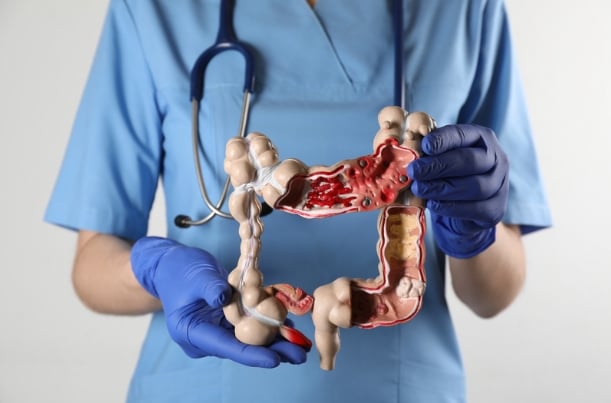
Preventing Bowel Cancer: Keys to a Healthy Digestive System
Maintaining a thriving digestive system isn't just a wellness perk; it's your body's guardian against the looming specter of bowel cancer, also known as colorectal cancer—a disease that unfortunately ranks high among the most prevalent. Yet, the silver lining here is that it's largely preventable. Your defense? Well, it lies in your lifestyle choices and what you put on your plate.
Now, what we're about to unravel in this article are the magic keys to a digestive system that's humming with vitality, all while acting as an impervious shield against bowel cancer. We're talking about the marvel of fiber-rich diets and the heroics of regular exercise. These are the two pillars we'll lean on to strengthen your gut and, in turn, decrease your susceptibility to bowel cancer.
So, as we journey through these insights, you'll be arming yourself with the ultimate arsenal—a safeguarded digestive system and a shield against the menace of bowel cancer. Let's embark on this voyage to unlock the secrets of a resilient gut and a life liberated from the clutches of cancer.
Understanding bowel cancer

Colorectal cancer, commonly referred to as bowel cancer, is a formidable adversary targeting the colon and rectum. This stealthy disease emerges when rogue cells multiply uncontrollably, forming a clandestine tumor within the intricate digestive network. Left unchecked, it can turn into a life-threatening menace. To thwart its advances, we must grasp the telltale signs and risk factors, nurturing the art of early detection and prevention.
The likelihood of battling this insidious foe increases, with individuals crossing the age threshold of 50 being particularly susceptible. However, the shadow of risk is also cast by familial ties tainted with a history of bowel cancer, personal journeys through inflammatory bowel disease, dietary choices laden with processed meats and devoid of fiber, a life marked by inertia, the specter of obesity, the temptation of tobacco, and the allure of excessive alcohol. Armed with this knowledge, one must embark on a quest to mitigate these risks and safeguard their well-being.
Importance of a healthy digestive system
Well-functioning digestive system forms the cornerstone of your overall well-being. It enables your body to skillfully unravel and assimilate vital nutrients from the foods you savor, all while efficiently purging out waste and harmful substances. When your digestive system is in prime condition, the discomforts of bloating, constipation, or diarrhea are far less likely to disrupt your day.
Nurturing a robust digestive system holds a pivotal role in shielding against the scourge of bowel cancer. Your colon and rectum, integral parts of this system, are gatekeepers for potential issues that could elevate your risk of developing this form of cancer. By actively tending to the health of your gut, you can diminish inflammation, foster regular and healthy bowel movements, and nurture the flourishing of helpful bacteria. These combined efforts serve as a formidable defense, significantly reducing your susceptibility to bowel cancer.
Risk factors for bowel cancer

Bowel cancer, a complex condition, has various risk factors that play a role in its development. While some of these determinants, like age and family history, remain beyond our control, there exists a realm of influence where we can actively engage to diminish our susceptibility. By delving into the intricacies of these risk elements, you empower yourself to make informed decisions that safeguard your digestive well-being and diminish the likelihood of encountering bowel cancer.
The culinary choices we make wield a considerable influence, particularly in the case of processed meats such as bacon and sausages. These seemingly delectable options harbor insidious components capable of wreaking havoc on the cells residing in the colon and rectum, ultimately setting the stage for cancer to emerge. Conversely, a diet replete with fruits, vegetables, whole grains, and legumes bestows vital nutrients and dietary fiber, nurturing a robust digestive system while concurrently diminishing the peril of bowel cancer.
Yet another substantial contributor to the risk of bowel cancer is our level of physical activity—or lack thereof. A sedentary lifestyle has the potential to decelerate the digestive process, ushering in complications like constipation and various other digestive maladies. On the flip side, regular physical exertion emerges as a potent ally, reducing the likelihood of bowel cancer through its digestive-enhancing, inflammation-reducing, and weight-maintaining attributes.
Diet and nutrition for a healthy digestive system

Maintaining a vibrant digestive system and reducing the chances of developing bowel cancer hinges on your dietary choices. Ensuring a diverse array of nutrient-packed foods in your meals can supply the vital vitamins, minerals, and fiber your digestive health craves. Let's explore some dietary recommendations to nurture a thriving gut:
- Embrace fiber: Fiber plays an indispensable role in sustaining a robust digestive system. It bulks up your stool, facilitating smoother passage and guarding against constipation. Make room for fiber-rich goodies like fruits, veggies, whole grains, and legumes in your daily culinary adventures.
- Mind processed meats: Processed meat products pack a punch of harmful elements that can elevate the risk of bowel cancer. It's wise to keep your rendezvous with bacon, sausages, hot dogs, and deli meats to a minimum.
- Choose lean protein: When it comes to protein, opt for lean champions like poultry, fish, beans, and lentils. These nutritional powerhouses provide essential nutrients without the baggage of processed meats.
- Hydration is key: Don't underestimate the magic of staying well-hydrated. A daily goal of at least 8 glasses of water is your ticket to a smoothly functioning digestive system.
- Watch your alcohol intake: Excessive alcohol consumption can provoke irritation in your digestive system lining and elevate the risk of bowel cancer. Should you choose to indulge, moderation should be your guiding principle.
- Nurture with probiotics: Your gut will thank you for introducing beneficial bacteria. Welcome probiotic-rich companions like yogurt, kefir, sauerkraut, and kimchi into your dietary ensemble to support a flourishing gut microbiome.
Regular exercise and its impact on bowel health

Staying active isn't just about keeping your heart in good shape and managing your weight; it also does wonders for your digestive well-being. When you get moving, it wakes up the muscles in your digestive system, making sure everything moves along smoothly and you don't have to deal with the discomfort of constipation.
Taking a brisk walk, hopping on your bike, hitting the pool, or getting your groove on with some dance moves for at least 30 minutes every day isn't just about staying fit. It's a smart move to lower your chances of dealing with bowel cancer. And when you keep up with your exercise routine, you're also helping yourself maintain a healthy weight, which is another strong defense against bowel cancer.
Maintaining a healthy weight to prevent bowel cancer

It's absolutely essential for your overall well-being to stay at a healthy weight, and it plays a significant role in warding off bowel cancer. When it comes to obesity, it's been linked to a higher chance of developing various forms of cancer, bowel cancer included. Carrying extra weight, especially around your waistline, can lead to long-term inflammation, resistance to insulin, and hormonal imbalances, all of which can fuel the growth of cancer.
To keep your weight in check, focus on eating a balanced diet filled with plenty of fruits, veggies, whole grains, and lean proteins. Steer clear of going overboard with sugary drinks, processed foods, and high-fat snacks. Blend a wholesome diet with regular physical activity to reach and sustain a healthy weight.
Quitting smoking and reducing alcohol consumption

When it comes to staying healthy, it's worth mentioning that enjoying a smoke or knocking back a few too many drinks on a regular basis can put you in the danger zone for bowel cancer. It's like they team up to harm the cells in your digestive system, stirring up inflammation and increasing the odds of cancer knocking on your door. The good news is, though, if you kick that smoking habit to the curb and ease up on the booze, you're actually doing your body a solid by significantly slashing your chances of dealing with bowel cancer and boosting your overall well-being.
If you're on the lookout for some help in the battle against those nicotine cravings or that extra glass of wine, don't hesitate to reach out to the pros in the healthcare world or join a supportive group. These folks have the inside scoop on how to steer you in the right direction, offering up advice, tools, and smart moves to help you make those positive changes and keep the risk of bowel cancer at bay.
Screening and early detection of bowel cancer

Detecting bowel cancer at an early stage is absolutely crucial for its prevention. Through regular screenings, we can spot precancerous polyps or the initial stages of cancer when treatment holds the most promise. There are two primary methods for screening for bowel cancer: colonoscopy and the fecal occult blood test (FOBT).
Colonoscopy involves a thorough examination of the entire colon and rectum, done using a flexible tube equipped with a camera. This procedure enables the identification and removal of precancerous polyps. On the other hand, FOBT is a non-invasive test that looks for minute traces of blood in the stool, which can be an early indicator of bowel cancer.
Both of these tests are highly effective in detecting bowel cancer early. The choice between them depends on various factors, such as age, family medical history, and personal preferences.
Lifestyle changes to promote a healthy digestive system

In addition to dietary choices, regular exercise, and maintaining a healthy weight, there are several other lifestyle changes you can make to promote a healthy digestive system and lower your risk of bowel cancer:
- Handling life's pressures: Long-term stress can really throw your digestion off track and up the risk of tummy troubles. So, try grounding yourself with relaxation methods like meditation, deep breathing, or immersing yourself in hobbies that ease the mind.
- The beauty of a good night's rest: Slumber isn't just for sweet dreams; it's also crucial for your body's inner workings, especially the digestive bit. Shoot for a solid 7-9 hours of rejuvenating sleep every night.
- Keeping it clean and tidy: Before digging into meals or after restroom breaks, be sure to scrub those hands clean. This simple act helps stop those pesky gut bugs from spreading and causing digestive chaos.
- Antibiotics when needed: You know, antibiotics can be lifesavers, but they can also mess up the delicate balance of gut bacteria. Don't pop 'em like candy; only use 'em when your doc gives the green light, and follow their guidance to a T.
- Trust your gut instincts: Your body has a way of talking to you, so don't ignore it. If you've got tummy troubles like persistent belly pain, bathroom habits gone awry, or red flags like blood in the stool, don't hesitate to seek advice from a medical pro.
Conclusion: Taking control of your digestive health
Maintaining a healthy digestive system is essential for overall well-being and plays a crucial role in preventing bowel cancer. By adopting a high-fiber diet, engaging in regular exercise, maintaining a healthy weight, quitting smoking, and reducing alcohol consumption, you can significantly reduce your risk of developing bowel cancer.
In addition to these lifestyle choices, regular screening for bowel cancer and making other positive lifestyle changes such as managing stress, getting enough sleep, practicing good hygiene, and avoiding unnecessary antibiotic use can further promote a healthy digestive system.
Taking control of your digestive health starts with understanding the keys to a healthy gut and implementing strategies to reduce your risk of bowel cancer. By making proactive choices and prioritizing your digestive health, you can safeguard yourself against the threat of bowel cancer and enjoy a life free from this preventable disease.
Remember, prevention is always better than cure, and when it comes to bowel cancer, prevention begins with a healthy digestive system.
Take charge of our digestive health and pave the way for a future free from bowel cancer. Your digestive system will thank you for it!
RECOMMENDATION:
To live a healthy life, start taking care of your digestive health by consuming Chobe Powdered Yogurt Drink now. Click here to Read More....


